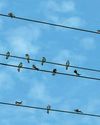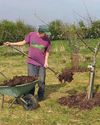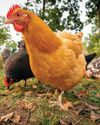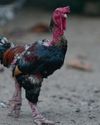
Over the years I have had the privilege of writing for Practical Poultry, I have covered many behavioural problems associated with chickens. Now, I want to cover a behavioural problem which is not of the chickens doing, but that of the owner. And that is, the manner in which many mishandle/carry their birds.
Unlike many domesticated pets, chickens do not take kindly to being handled, despite what people may believe. They are a prey species, and it brings out the fear in them that they are being attacked by a predator – this instinct has not been bred out of them. So, to handle them roughly, or inappropriately, can be an even more distressing experience. And there are some inexcusable ways in which chickens are routinely handled, in the erroneous belief that they are an acceptable part of their management.
NEVER CARRY THEM UPSIDE DOWN BY THEIR LEGS
One of the most common, and controversial ways of carrying a bird, is by its legs. In many countries it is legal to carry chickens this way, while others illegal; even where it is illegal, the practice still goes on regardless. Irrespective of whether it is legal or illegal, you are dealing with a live animal which deserves respect. Put yourself in the bird’s position, how would you feel if you were carried around upside down.
It is bad enough to carry one bird like this, but in the country where I live, I so often see people carry four or five in one hand. Chickens are crammed in small wire pens, and sold along the sides of roads, in full glare of the sun (while the seller is sat beneath the shade of a tree), without food or water. So, they are already suffering from stress/heat stress, for it only to be compounded even further, by being carted home upside down, and swung about like a toy.
This story is from the {{IssueName}} edition of {{MagazineName}}.
Start your 7-day Magzter GOLD free trial to access thousands of curated premium stories, and 9,000+ magazines and newspapers.
Already a subscriber ? Sign In
This story is from the {{IssueName}} edition of {{MagazineName}}.
Start your 7-day Magzter GOLD free trial to access thousands of curated premium stories, and 9,000+ magazines and newspapers.
Already a subscriber? Sign In

How to Buy a Smallholding in France- Long-time smallholder Lorraine Turnbull looks at the practicalities of moving to rural France
Aspiring smallholders are continually thwarted by the prices of smallholdings and property with land located within the UK. Even the humblest croft in Scotland comes with a substantial price tag and conditions which would make even an adventurous wannabee consider carefully. But all is not lost. For those willing to take the adventure of a lifetime, there is always Europe, and one of the most popular places is France.

Meet the Bournemouth goats and their supporters
These capricious animals are hard workers preserving the natural habitat

Still warm enough to sit outside with a Pizza
Henrietta Balcon uses fresh figs to create an unusual dish at Harvest time

Goodbye to the birds of spring and summer
If you look and listen you might be able to see them preparing to leave says The RSPB

Get ready for the colder weather in the warmth of late summer
Claire Waring advises on doing the best to make sure your colonies survive until next spring

Preparing the Veg Patch for Winter
Lee Senior says, a well-run plot can excitingly continue to produce good quality, tasty, fresh food for much of winter

Time to prepare to plant your orchard
Wade Muggleton, smallholder and author of The Orchard Book, shares his practical experience so you can create your own fruit collection

Choosing feed for the autumn
As autumn approaches, Joanna Palmer, nutritionist at the Smallholder Range, offers advice on choosing the right feed to support your adult birds through their annual moult and ensure your young birds grow and finish well at this time of the year.

Vet advice from an experienced poultry vet
Reflecting on how much the humble hen has helped people world wide plus advice on stopping the scourge of red mite

Give your hens some support
Paul Donovan looks at the right and wrong ways of handling birds